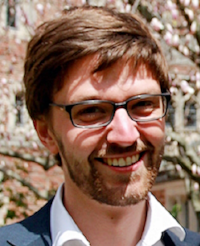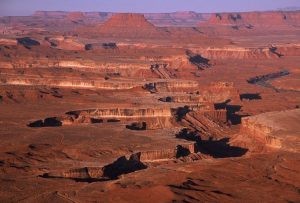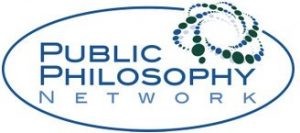Seed Grant Spotlight: Ben Mylius
The Center for Science and Society is pleased to announce its 2018 Seed Grant recipients. Projects were awarded funding to support their proposals for research, events, conferences, and workshops on interdisciplinary topics in Science and Society. This year, the Center has awarded funding to seven interdisciplinary projects led by faculty from a number of departments at Columbia University. Learn more below about Ben Mylius - a doctoral student in the Political Theory program at Columbia. He was awarded a seed grant in 2017 and a follow-up grant in 2018 to organize a student-led discussion group entitled Ecosalon!
Project Inspiration

Fittingly enough, the challenge of interdisciplinary ecological work first hit me in the middle of a maze. More specifically, I was about three days into a fieldwork trip in the Maze District of Canyonlands National Park for a Yale Project on the Anthropocene (this is a proposed epoch dating from the commencement of significant human impact on the Earth's geology and ecosystems). I was fresh out of law school, trying to choose a discipline for a PhD and exploring the area with a team made up of a soil ecologist, an environmental historian, a campaigner, a lawyer, and a filmmaker.
We were trying to get a handle on how our various disciplines "saw" the place and its many layers. Our conversations spanned the recent history of cowboys and ranchers, the older histories of Native Americans, the ecologies and geographies of the coyotes, jays, pinon pines, and lichens, not to mention the incomprehensibly ancient geological strata. But what struck me most was how we created a space to meet each other’s worldviews like I had never had before.

When I got to Columbia, I set out to find a group for similar experiences. I came across a range of wonderful people working as individuals. But gradually I realized that the majority of the opportunities available for students to come together were structured in very specific and formal ways. As graduate students, the places we could share our work were heavily weighted towards formal conferences presentations, with all the restrictions this entails. There wasn't much opportunity for us to "learn each other’s languages" in the kind of context free from fear and judgment that I had felt with my group in Canyonlands.
Of course, those formal opportunities are crucial for our scholarly and professional development and I am grateful that we have them. But we also need a place for fellowship across our many disciplines, which remind us of the spirit of curiosity and excitement that got us into academia in the first place. Especially in the context of ecological issues, where no one discipline covers the field, we need a place for warm and open intellectual exchange which allows people at an early stage of their careers to feel their way into new disciplines and ways of thinking without fear of judgment, humiliation, or failure. So, after attending several Center events, I thought of convening our Ecosalon.
The Project
We meet one evening a month, over tasty New York pizza, for a free-ranging conversation on ecological themes. Conservation biologists, architects, political scientists, environmental anthropologists, immunologist, art historians, and several in between have joined our crew.
The most important components of our conversations are the intellectual wandering and fun. We have covered some fascinating topics. To give just one example, one of our anthropologists suggested our group read a text on gender and rivers, written in a dense, allusive form. We started discussing its contents until one of the scientists in the group put up his hand and asked, sincere but bewildered, what on earth the anthropological text was supposed to be communicating! So we jumped into a conversation about the use of texts in different disciplines. We discovered that for scientists, texts ideally seem "invisible" and are read fast for the substance of their knowledge. Meanwhile, anthropologists saw reading texts as a process, with the experience of grappling with the text at least as vital as the "thesis" of the text itself.
One of the things I like most about our conversations is being unable to predict their contours in advance. When I speak to colleagues in my home discipline (political theory and law), I can predict the kinds of things people might say and the ways that they might say them. At Ecosalon, that all goes out the window. And so we get back to the practice of interdisciplinary conversation – the negotiations, confusions, laughter, and curiosity – that is essential to longer-term collaborations.
All of these exchanges have powerful effects. I’ve noticed them taking root in my own work. My research is focused on the ways that key concepts in political theory (freedom, sovereignty, justice), are struggling to deal with things like climate change because they’re based on outdated ideas about humans being ‘separate’ from nature. From thinking I could write a dissertation that explored these things using only literature from the humanities and philosophy, I've realized I'll need to find a way to bring in the natural science on climate, biodiversity, population and the Anthropocene. Doing that will be the only way to communicate across the disciplinary divides I've encountered, and do justice to the powerful work of my scientist colleagues and friends. From writing in an abstract philosophical idiom, I’ve come to see I’ll need to share my work through stories, so it reaches people beyond my own specialization. And from working as a "lone wolf," stuck at home in my office, I’ve started connecting to others at much earlier stages in projects, and am excited to see how their input will take my research outlines in unexpected directions.
Speaking of collaborations, it has been exciting to see the seeds of several different projects take root in recent meetings. One of our political scientists is in talks with our evolutionary biologist about Geographic Information Systems (GIS) mapping and satellite data techniques for population measuring. One of our conservation biologists has worked with one of our journalists on a piece about conservation and environmental policy here in the States. Several of our group have started working alongside our neuroscientist/comics writer on science communication. And I’ve gotten excited, myself, to collaborate with the entire group and the Columbia Digital Storytelling Lab on a project on climate and narratives.
Impact
I am incredibly grateful to CSS for the opportunities they’ve given us with their seed grant funding program. They were willing to take a gamble on a project that measured success and impact in unconventional ways, a gamble which – from my perspective, at least! – has paid off in spades. In February, I traveled to the Public Philosophy Network's 2018 conference to present "Thinking Ecologically: The Columbia Ecosalon Experiment," which explored the projects and experiences that have resulted from our monthly meetings. The various projects we’re now working on is one thing, but the biggest impact of all, from my point of view, is that each of us now has a network of others from across the university to draw on as future questions arise. These are people we wouldn’t have met in any other way, and in disciplines we don’t know well ourselves.

Through Ecosalon, we’ve been able to connect them and give them the sense of community they’ll need to reach out to one another. We’ve been able to give people the chance to ‘be experts’ in their own fields, amongst what is effectively a highly-educated but (in their field) lay audience. And we’ve been able to create solidarity amongst our members, by reminding them that, daunting as ecological questions are, there are thinkers far beyond their own horizons who are out and exploring – and who are willing to join them on the tentative, step-by-step work of trying to make an impact, in the university and beyond.
I’m looking forward to seeing what the next year or two might bring: an exhibition? A conference? A podcast? A proposal for a co-taught course? And I’m excited to welcome other graduate students, postdocs, and other Columbia affiliates to our ongoing conversations.
If you’re keen to join, we’d love to hear from you!
Ben Mylius
Ben ([email protected]) is a doctoral student in the Political Theory program at Columbia looking at the ways that key concepts in political theory (freedom, sovereignty, justice), are struggling to deal with things like climate change. You can learn more about his research on his personal website.
Interested in supporting Ben or our other fantastic seed grant awardees? Visit our donation page or feel free to contact us.
